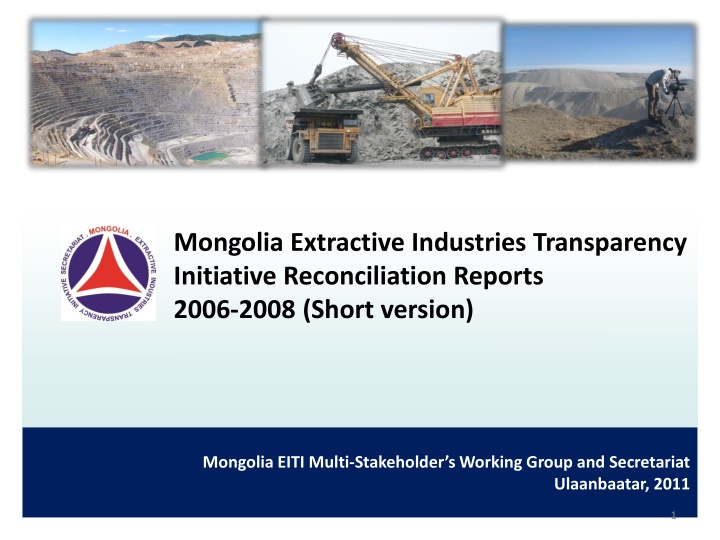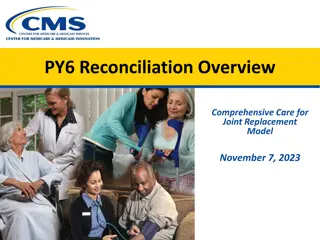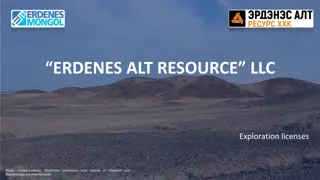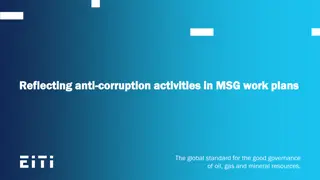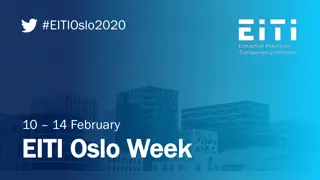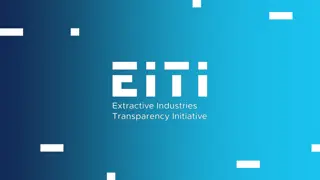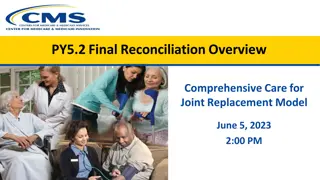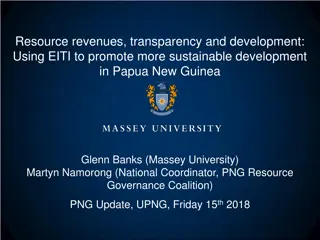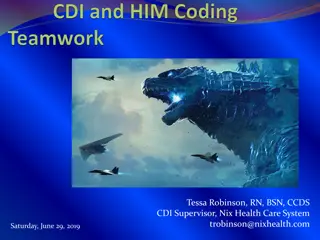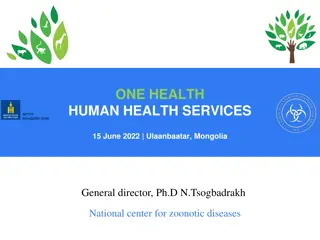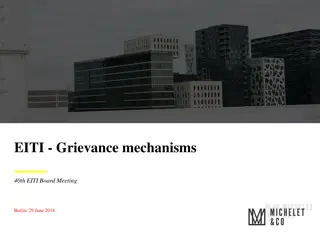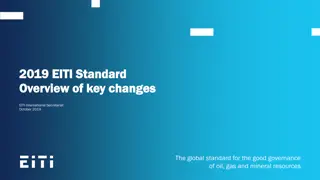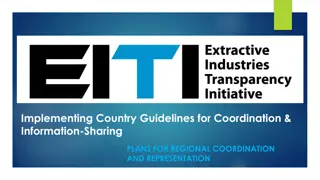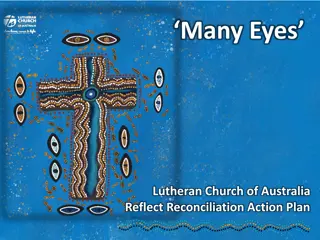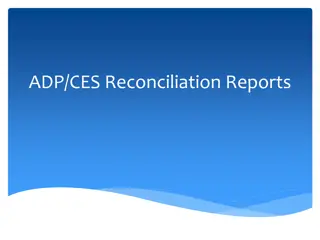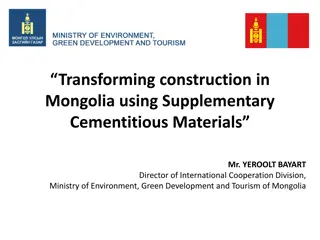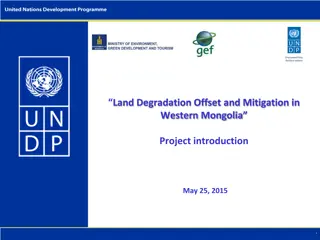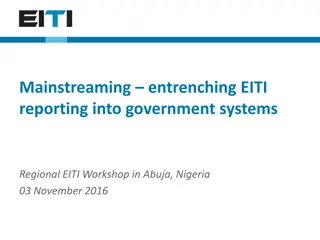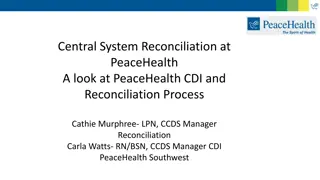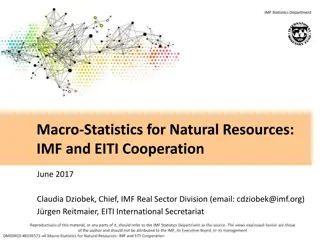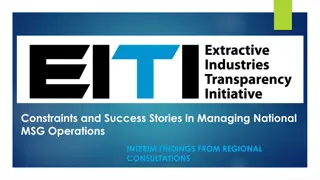Overview of Mongolia EITI Reconciliation Reports 2006-2008
Mongolia's Extractive Industries Transparency Initiative (EITI) reconciliation reports from 2006 to 2008 show an increase in the number of reporting companies and a decrease in discrepancies. The reports reveal transparency levels in state budget allocation, taxes, and payments from reconciled companies. Major findings indicate discrepancies in taxes, fees, and donations, with explanations for discrepancies related to VAT rebates and offsetting against accumulated credit balances. The reports aim to improve transparency in Mongolia's extractive industries.
Download Presentation

Please find below an Image/Link to download the presentation.
The content on the website is provided AS IS for your information and personal use only. It may not be sold, licensed, or shared on other websites without obtaining consent from the author.If you encounter any issues during the download, it is possible that the publisher has removed the file from their server.
You are allowed to download the files provided on this website for personal or commercial use, subject to the condition that they are used lawfully. All files are the property of their respective owners.
The content on the website is provided AS IS for your information and personal use only. It may not be sold, licensed, or shared on other websites without obtaining consent from the author.
E N D
Presentation Transcript
Mongolia Extractive Industries Transparency Initiative Reconciliation Reports 2006-2008 (Short version) Mongolia EITI Multi-Stakeholder s Working Group and Secretariat Ulaanbaatar, 2011 1
Overview of Mongolia EITI Reconciliation Reports 2006-2008 Since it s first Mongolia s EITI reconciliation report in 2006, Mongolia had three reports for the year of 2006, 2007 and 2008. It is valuable result that every year number of companies has been increasing and amount of discrepancies has been reducing. (See table 1) Table 1. Comparison 2006 2007 2008 Number of companies reported by Government 134 134 184 Number of companies reported 64 102 113 Of which: Number of selected companies to the reconciliation report 25 38 46 Level of materiality of company payments 200 million MNT < 200 million MNT < 100 million MNT < As seeing table above, 36-46 percent of state budget are transparent as a result of EITI report. Unexplained discrepancies (MNT) 25 billion MNT 4 billion MNT* 775 million MNT 420 million MNT Mongolia Extractive Industries Transparency Initiative Reconciler (Audit firms) Crane White & Associates, Australia Consortium of Mongolia and Malaysia Ernst & Young Audit Firms Consortium of Ulaanbaatar Audit Corporation LLC, Mongolia and Hart Nurse Ltd, UK Table 2. Financial Flow 2006 2007 2008 Total State Budget Income 1,354,098.9 1,855,963.6 2,151,049.8 As seeing table above, 36-46 percent of state budget are transparent as a result of EITI report. Total Tax Income 1,128,141.5 1,502,309.9 1,890,896.6 Total Reconciled Companies Payment 492,287,7 690,584,6 682,647,0 Percentage 44% 46% 36% 2
Overview of Mongolia EITI Reconciliation Reports 2006-2008 Since it s first Mongolia s EITI reconciliation report in 2006, Mongolia had three reports for the year of 2006, 2007 and 2008. It is valuable result that every year number of companies has been increasing and amount of discrepancies has been reducing. (See table 1) 184 Unresolved Discrepancy 25,0 billion MNT 134 134 113 102 64 46 38 25 775,0 million MNT 420,0 million MNT 2006 2007 2008 Mongolia Extractive Industries Transparency Initiative 2006 2007 2008 Government Company Selected companies 2006 2007 2008 Total State Budget Income 1,354,098.9 1,855,963.6 2,151,049.8 Total Tax Income 1,128,141.5 1,502,309.9 1,890,896.6 Total Reconciled Companies Payment 492,287,7 690,584,6 682,647,0 Percentage 44% 46% 36% 3
Mongolia First EITI Reconciliation Report - 2006 The first reconciliation covers 25 companies reports above 200,0 million MNT materiality payments and Government receipts. In this report, the Government has declared receipts with the amount of 467,1 billion MNT, companies has proved payments with the amount of 492,2 billion MNT (See table 3). Major Findings: The major discrepancies were from taxes (appx. MNT 552,1 million), fees (appx. MNT 20,0 billion) and donations (appx. MNT 3,7 billion). From the Taxes section the main discrepancies were mainly from items reported such as Value added tax deducted from paid back, Corporate income tax, and tax on petrol and diesel fuel amounting to MNT 1,4 billion, MNT 2,0 billion, and MNT 1,0 billion respectively. Main reasons: VAT is paid by mining companies on the procurement of goods and services from the local market. Export of minerals however attracts a VAT rebate and as a result mining companies accumulate large net VAT credit balances (balances due to them). Amounts levied for other taxes (e.g. income tax, Windfall tax) can be offset against such accumulated credit balances. EITIM instructions do not provide clear guidelines as to how the various VAT items are to be dealt with in the templates. As a result there was no consistency between companies, and between companies and the tax office in respect of what was included in templates. In Corporate income tax, the major unresolved issue relates to the offsetting by the tax office of corporate income and other taxes levied against accumulated VAT credits. The major matter adjusted related to one company including an incorrect figure in their template. The vast majority of the net aggregated unresolved discrepancy relates to another company who advised they were too busy to follow up the matter. Mongolia Extractive Industries Transparency Initiative 4
Mongolia First EITI Reconciliation Report - 2006 Major Findings (cont): The discrepancies noted for the Fees were mainly from items such as License fee for exploitation and exploration of mineral resources, Royalty fee, Reimbursement of deposit, exploration of which is carried out by the budget fund, Land fee and Fee for recruiting foreign experts and workers amounting to MNT 7,7 billion, MNT 1,1 billion, MNT 1,8 billion, MNT 7,2 billion and MNT 1,6 billion respectively. Dividends on state and local property: Erdenet paid a dividend of 59,152,701 on 29th December 2006. The transfer was however not credited to the recipients account by the bank until 2nd January 2007 and was therefore treated as a 2007 receipt and not included in the Governments 2006 template. Donations: Company templates recorded significant donations that were not included in Government templates. In order for the Government templates to be properly completed for these items it would be necessary to collect data on donations received from a large number of recipients. Mongolia Extractive Industries Transparency Initiative 5
Mongolia First EITI Reconciliation Report - 2006 Reconciler s Recommendations: Instructions on completing templates: Many discrepancies have occurred because of completing templates false or incomplete, therefore instructions need to be revised and in particular expanded to include specific detailed instructions (e.g. VAT, customs taxes, cut-offs etc) Unexplained discrepancies: It would be far more productive to concentrate efforts on implementing the recommendations contained herein in order to overcome problems in subsequent reconciliations rather than trying to resolve the outstanding 2006 discrepancies. Incomplete Government data: An adequate information gathering/reporting system needs to be introduced to ensure that requests for information on receipts from mining companies are forwarded to all Government entities in a frequently basis and that a response is received from all such entities. Donations to Governmental and local organizations: It is necessary to introduce some form of simple but efficient system to enable the Government to ascertain who donations were paid to. Mining companies to periodically report details of donations to soums, aimags, and Government agencies. For about non monetary in-kind of donations, mining companies would have a record of the cost of goods provided and issue some form of donation note (e.g. a form of no charge invoice that records the cost of goods or services donated) to the recipient for each donation. Mongolia Extractive Industries Transparency Initiative 6
Mongolia First EITI Reconciliation Report - 2006 Reconciler s Recommendations (cont): VAT: is a complex area and we note that EITI advises that it can be excluded from the reconciliation process. Or in particular specific instructions need to be included in respect of VAT (VAT collected by the customs office, off sets of other taxes against VAT credits, VAT paid to local suppliers on the procurement of goods and services) Customs tax: The template instructions should include clear detailed instructions dealing with what information is required for both the company and Government templates. In particular the treatment of VAT collected by the customs office on imported goods should be clearly spelt out. EITIM also needs to consider whether fees for the customs bond store should be reported. Mongolia Extractive Industries Transparency Initiative 7
Mongolia First EITI Reconciliation Report - 2006 Table 3. Aggregated financial flows, by types of payments Mongolia Extractive Industries Transparency Initiative 8
Mongolia First EITI Reconciliation Report - 2006 Table 4. Aggregated financial flows, by companies Mongolia Extractive Industries Transparency Initiative 9
Mongolia Second EITI Reconciliation Report - 2007 The Second reconciliation covers 38 companies reports above 200,0 million MNT materiality payments and Government receipts. In this report, the Government has declared receipts with the amount of 750,0 billion MNT, companies has proved payments with the amount of 750,0 billion MNT (See table 5). Major Findings The unresolved discrepancy was balanced with the amount of 11,5 billion MNT , because of Altan Dornod Mongol LLC s tax issue amounted 10,7 billion MNT was in international arbitration court, this amount was deducted from above balance and final unresolved discrepancy amounted MNT 775 million. The major discrepancies were fees, charges and services charges, expenditure for environmental protection and donations. From the Taxes section the main discrepancies were mainly from items Customs tax, Excise on imported fuel and oil materials. Mongolia Extractive Industries Transparency Initiative The discrepancies noted for the Fees were mainly from items such as Royalty fee and Reimbursement of deposit, exploration of which is carried out by the budget fund Charges and Service charges: it was mainly due to the Foreign Affairs and Immigration Office of Mongolia not being able to provide any further information on the amounts reported for the two companies, Boroo Gold and Petro China Dachin Tamsag. 10
Mongolia Second EITI Reconciliation Report - 2007 Reconciler s Recommendations: Timeline: Further consideration on the timing of this exercise should be taken into account for future EITI Reconciliation and Report engagements to avoid holiday periods and financial reporting deadlines. In addition, in the event that key personnel from companies and Government Entities are not available, alternative personnel should be identified. MoF should be entrusted with the overall role of monitoring these government entities to facilitate timely submission as well as the completeness and accuracy of the information submitted. For information on Land rent and fee for water use provided by soums, the GDTM should ensure that a detailed listing of all these receipts received from companies by the various soums be prepared on a regular basis and submitted to the aimags for compilation. Details on donations should be captured on a regular basis to allow an accurate reconciliation Mongolia Extractive Industries Transparency Initiative 11
Mongolia Second EITI Reconciliation Report - 2007 Reconciler s Recommendations (cont): Instructions on completing templates should be detailed The reporting of payments received by companies involves various government bodies and in order to ensure completeness of data captured and reported, a concerted effort will have to be made by the MoF A Help Desk should be set up to tackle any problems or questions that maybe faced by the companies and government entities in the completion of the EITI templates Due to custom tax, custom service fee and expenditure incurred in relation to environmental protection amounts were reported as a lump-sum payments the supporting details were unavailable, therefore to avoid the aforementioned being repeated in the future, adequate instructions and guidelines should be developed for accountants. Mongolia Extractive Industries Transparency Initiative 12
Mongolia Second EITI Reconciliation Report - 2007 Table 5. Aggregated financial flows, by types of payments Mongolia Extractive Industries Transparency Initiative 13
Mongolia Second EITI Reconciliation Report - 2007 Table 6. Aggregated financial flows, by companies The unresolved discrepancy was balanced with the amount of 11,5 billion MNT , because of Altan Dornod Mongol LLC s tax issue amounted 10,7 billion MNT was in international arbitration court, this amount was deducted from above balance and final unresolved discrepancy amounted MNT 775 million. Mongolia Extractive Industries Transparency Initiative 14
Mongolia Third EITI Reconciliation Report - 2008 The third reconciliation covers 46 companies reports above 100,0 million MNT materiality payments and Government receipts. In this report, the Government has declared receipts with the amount of 684,9 billion MNT, companies has proved payments with the amount of 686,0 billion MNT (See table 7). Major Findings The major unresolved discrepancies were mainly from items expenditure for environmental protection and charges and service charges amounting MNT 669,3 million and MNT 356,7 million. Expenditure for environmental protection: Several differences are difficult to be resolved since the information sources for the expenditures of environmental protection are different. The mining companies submit their Completion report of Environment plan annually and our team has noticed that the reports are not in consistence of their financial statements, and the reports mostly prepared by the geologist of the companies. Therefore, the differences were difficult to be resolved. Charges and Service charges: Main reasons in respect of stamp and other charge for state registration paid to state and local administration in accordance with relevant law are as follow: It was due to lack of detailed guidance in methodology of filling-up the Template No.1 on what types of charges to be maintained or included, and not clear information flow to consolidate to the government reporting. It is not reported in the government reporting due to not obvious seeing of the figures in the financial statements since the companies have reported charges and service charges as per their own classifications. In order to adjust the companies figures we have sent the confirmations letters to the local government organisations, however, the local government officials are not showing importance to reply to our letters, and the received replies are not satisfactory. Mongolia Extractive Industries Transparency Initiative For Taxes, discrepancy was mainly from Customs tax amounting MNT 59,8 million. Fees: mainly from Royalty tax, Land fee, Fee for water use, Fee for recruiting foreign experts and workers amounting MNT 18,2 million, MNT 5,7 million, MNT 9,2 million, and MNT 29,4 million. 15
Mongolia Third EITI Reconciliation Report - 2008 Reconciler s Recommendations: The EITI objectives and process for Mongolia should be codified in legislation There should be improved definitions for each revenue stream included in EITI The scope of each revenue stream and the items to be included in it should be defined. This will help to avoid confusion over the correct completion of the templates. Company EITI submissions should be subject to audit confirmation Consideration could be given to exempting from this process companies whose payments fall below a minimum threshold, since it can be burdensome for small organisations, whose payments may not be material to overall EITI revenues. Government processes for collection and reporting of information for EITI should be audited periodically There is currently no provision for government processes to be audited as envisaged under EITI rules. A periodic review would assist in improving these processes and making them more robust (see section 8.5 on difficulties experienced during the 2008 reconciliation). Sub contractors Sub-contractors are used by some mining companies in Mongolia to carry out activities which are carried out by other mining companies themselves; for example, drilling, earthmoving and restroration-these are directly connected to extractive activity. In companies where they are used, sub contractors will make payments to government which would be included in EITI if the operation were carried out by the company itself but which are omitted under the existing selection criteria used by the MEITI Working Group. Donations The donations reported by companies did not represent, in many cases, payments to government; rather, they were costs which the company incurred voluntarily and has designated as being for the benefit of the community (e.g. construction of a road). We recommend that the Working Group should review the definition of items to be included under donations for EITI and require companies to exclude, or to show under the voluntary return, all items which are not paid to government; and consider whether a minimum value is appropriate for reporting donations Charges and service charges The total receipts reported for these charges by government in 2008 amounted to MNT 2.5 billion, out of total adjusted receipts of MNT 685 billion. These charges represent only 0.36% of total government receipts captured under the current EITI exercise and the Working Group should consider whether they should be included as a material receipts from the extractive sector. Mongolia Extractive Industries Transparency Initiative 16
Mongolia Third EITI Reconciliation Report - 2008 Reconciler s Recommendations (cont): Costs disbursed for protection of the environment These costs are reported by companies but are not paid to government bodies, rather they are paid to local contractors for various works. Unresolved discrepancies should be examined Despite extensive efforts, it was not possible to obtain information and explanations which enabled all the discrepancies to be resolved, although the overall discrepancies were reduced to 0.16% of reported government receipts. The Working Group should consider how these should be treated. Systems and supporting information at a number of government agencies require improvement The audited accounts of companies should include a statement of cash flows reported under EITI Such a statement would be prepared on a cash basis, reconciled where applicable to amounts included in the financial statements, and included in the audit opinion given by the company s independent auditor. Consideration should be given to treating mining and oil companies separately within MEITI where appropriateThere are commonalities between the regulation of the mining and oil sectors. However, there are also differences, both in certain areas of regulation and also in the contractual environment.The Working Group should review these and make any necessary changes for future reconciliation exercises. Communication methodsCommunications between local offices around Mongolia and central Ministry offices is hampered by lack of any reliable form of electronic communication, for example an email system. This makes transfer of information slow and cumbersome, as well as introducing the potential for error and omission due to the need to transfer data through the post. Consideration should be given to introducing an email system, and in the medium term, shared electronic databases to improve working efficiency. Mongolia Extractive Industries Transparency Initiative 17
Mongolia Third EITI Reconciliation Report - 2008 Table 7. Aggregated financial flows, by types of payments Mongolia Extractive Industries Transparency Initiative 18
Mongolia Third EITI Reconciliation Report - 2008 Table 8. Aggregated financial flows, by companies Mongolia Extractive Industries Transparency Initiative 19
